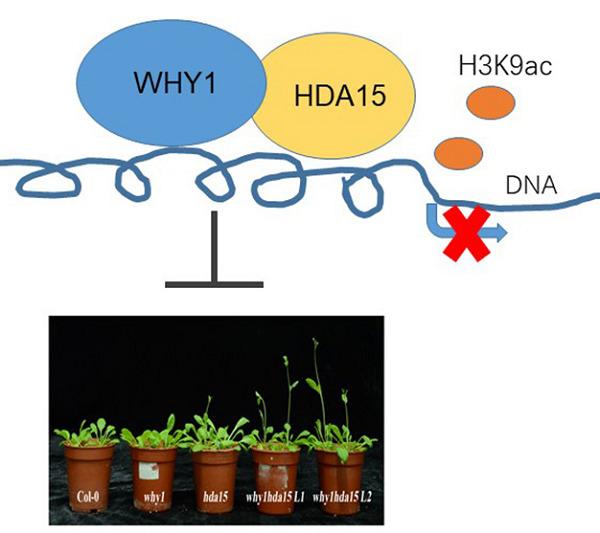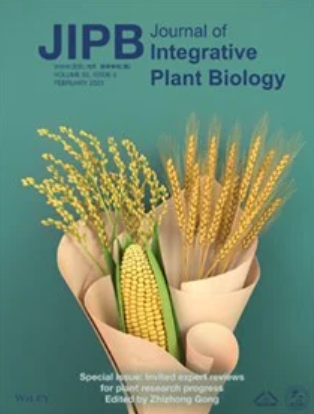WHIRLY1 recruits the histone deacetylase HDA15 repressing leaf senescence and flowering in Arabidopsis
IF 9.3
1区 生物学
Q1 BIOCHEMISTRY & MOLECULAR BIOLOGY
引用次数: 9
Abstract
Leaf senescence is controlled by a complex regulatory network whose robustness is ensured by the activity of transcription factors and epigenetic regulators. However, how these coordinate the process of leaf senescence remains poorly understood. We found that WHIRLY1 interacts with HDA15, a Reduced Potassium Dependence3 (RPD3) /Histone Deacetylase1 (HDA1)-type histone deacetylase, by using GFP-nanotrap-mass spectrum assays. The development-dependent interaction between WHIRLY1 and HDA15 was further confirmed by BiFC assays and CoIP assays in Arabidopsis. Multi-omics genome-wide transcriptome and H3K9 acetylome enrichment analysis showed that HDA15 delays leaf senescence and flowering by repressing the expression of the positive regulators of leaf senescence and flowering, such as LOX2 and LARP1C, and reducing H3K9ac levels at these loci; WHIRLY1 and HDA15 co-target to the region near the transcription start site of a subset of nutrient recycling related genes (e.g., Glutathione S-transferases 10, non-coding RNA, and photosystem II protein D1 synthesizer attenuator PDIL1-2), as well as WRKY53 and ELF4, and co-repress their expression by removing H3K9 acetylation. Our study revealed a key transcription regulatory node of nutrient recycling and senescence associated genes involved in leaf senescence and flowering via the recruitment of HDA15 by the ssDNA/RNA binding protein WHIRLY1. This article is protected by copyright. All rights reserved.

WHIRLY1募集组蛋白去乙酰化酶HDA15,抑制拟南芥叶片衰老和开花
叶片衰老是由一个复杂的调控网络控制的,其中稳健性是由转录因子和表观遗传调节剂的活性保证的。然而,这些如何协调叶片衰老的过程仍然知之甚少。通过绿色荧光蛋白-纳米阱-质谱分析,我们发现WHIRLY1与组蛋白去乙酰化酶(HDA)15相互作用,HDA 15是一种降低钾依赖性(RPD3)/ hda1型HDA。在拟南芥中,通过双分子荧光互补实验和共免疫沉淀实验进一步证实了WHIRLY1和HDA15之间的发育依赖性相互作用。多组学全基因组转录组和H3K9乙酰基富集分析表明,HDA15通过抑制叶片衰老和开花的正调控因子LOX2和LARP1C的表达,降低这些位点的H3K9ac水平,延缓了叶片衰老和开花;WHIRLY1和HDA15共同靶向营养循环相关基因子集(如谷胱甘肽s -转移酶10、非编码RNA、光系统II蛋白D1合成衰减器PDIL1-2)以及WRKY53和ELF4转录起始位点附近的区域,并通过去除H3K9乙酰化来共同抑制它们的表达。我们的研究揭示了通过单链DNA/ rna结合蛋白WHIRLY1募集HDA15参与叶片衰老和开花的营养循环和衰老相关基因的关键转录调控节点。
本文章由计算机程序翻译,如有差异,请以英文原文为准。
求助全文
约1分钟内获得全文
求助全文
来源期刊

Journal of Integrative Plant Biology
生物-生化与分子生物学
CiteScore
18.00
自引率
5.30%
发文量
220
审稿时长
3 months
期刊介绍:
Journal of Integrative Plant Biology is a leading academic journal reporting on the latest discoveries in plant biology.Enjoy the latest news and developments in the field, understand new and improved methods and research tools, and explore basic biological questions through reproducible experimental design, using genetic, biochemical, cell and molecular biological methods, and statistical analyses.
 求助内容:
求助内容: 应助结果提醒方式:
应助结果提醒方式:


